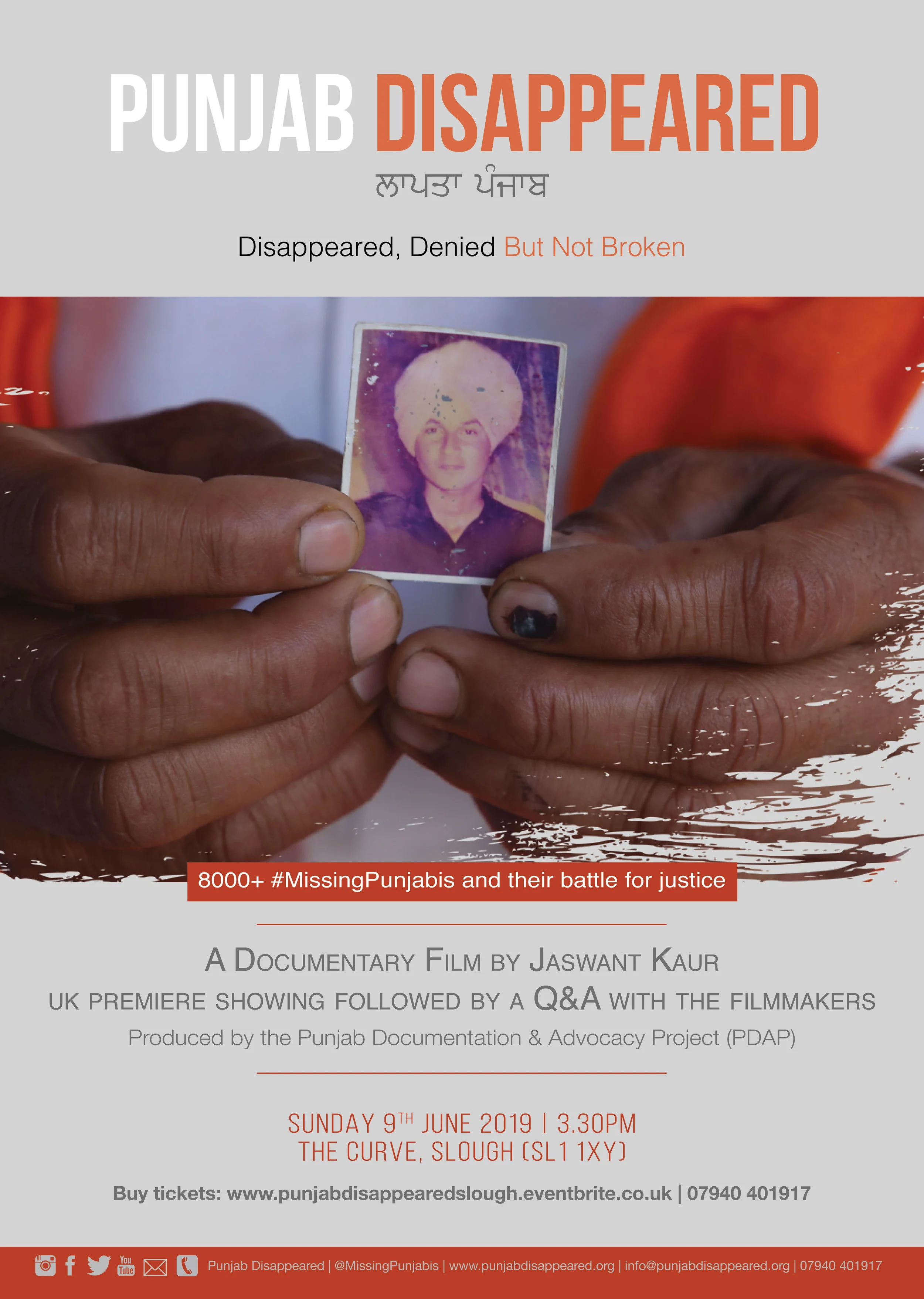A Review of ‘Punjab Disappeared’. The Documentary UK Premiere
ਵਾਹਿਗੁਰੂ ਜੀ ਕਾ ਖਾਲਸਾ ਵਾਹਿਗੁਰੂ ਜੀ ਕੀ ਫਤਿਹ
Every time I hear the word ‘Lapta or Disappeared ’ it immediately throws my mind into a place where it fights with the paradigms created by the states. This fight in my mind ends up in a shift of responsibilities which were passed on to me by my ancestors which pushes me to learn more and more. I was very excited when I heard that ‘Punjab Disappeared’ film would be screened in various cities of the UK but at the same time had so many unanswered questions in my mind about the Lapta or disappeared Sikh youth of Punjab as my family were personally affected by it as well.
The event attracted young students, human rights activists, volunteers and older community members who were personally affected by the enforced disappearances in Punjab. The venue of the event ‘The Curve’ was impressive and it was great to see a number of young students and activists present at the event.
The film was really insightful and very moving. I began to comprehend how hard it is for the families to live on after experiencing so much pain and uncertainty. I discovered that it was not only one member of the family who was killed but in actual fact, the Punjab Police would have tortured and harassed many extended members of that family. This paints a much more complex picture of trauma and healing per family which I simply hadn’t comprehended before. It was also so sad to hear from a young woman (of a similar age to me) crying whilst holding a photo of her dad in her hand explaining how difficult her life had been because she still hadn’t received something as simple as a death certificate for her father. She just wanted to know whether her father was dead or alive.

It was such a great blessing to see activists from Manipur, Kashmir, Chhattisgarh and Punjab standing shoulder to shoulder to share their pain but at the same time aspiring to challenge the brutality of the Indian state’s military/police forces together. One line from an Adivasi activist from Chhattisgarh still haunts me, she said “if people could have come together to stop this impunity of the Indian State in Punjab, I can say then the people who are committing the same atrocities in my place and other places of India may have had to think twice before killing and raping anyone.”
A panel discussion was conducted after the screening of the film in which a lot of questions were answered by the PDAP team members Bhai Satnam Singh and Bibi Jaswant Kaur. The highlight for me was when someone questioned what will be the impact of the work. The answer of Bhai Satnam Singh really struck me, he said ’We Sikhs are here to serve everyone and the fight which we are fighting may prevent another genocide in the future.’ Internally I felt so blessed after hearing this because the current state of the Indian regime is really severe and marginalises non-Hindu communities. The largest case with more than 8000 victims which the PDAP team are working on may truly save people from all communities who may be a target of Indian state impunity in the future.
“I feel really blessed and motivated after the screening today… (I’m able to) comprehend the blessing of being a Sikh and the goal to serve others and stand up for justice.”
My take away message from today was inspired by Bhai Amarjit Singh Khalra (the brother of Bhai Jaswant Singh Ji Khalra who lives in Slough and was in attendance). I began to understand that the responsibility on the shoulders of us young Sikhs is huge. Sometimes it can 25 years or more to convey the message but the message will always resonate with truth-seeking souls.
Jaspreet Singh at the premiere in Slough on Sunday 9th June 2019 alongside Jaskeerut Kaur (Birmingham City University) and Caren Kaur (King’s College London).
I feel really blessed and motivated after the screening today. It gave me a place where I was able to struggle with my mind and get it to comprehend the blessing of being a Sikh and the goal to serve others and stand up for justice. I urge students of all backgrounds to take the opportunity to watch the documentary and see the filmmakers who are truly some of the most inspiring and passionate individuals you will have the honour of meeting.
Jaspreet Singh
“>
Jaspreet Singh at the premiere in Slough on Sunday 9th June 2019 alongside Jaskeerut Kaur (Birmingham City University) and Caren Kaur (King’s College London).
This article has been reproduced from the original article published on the website of British Organisation of Sikh Students (BOSS). You can read the original article on their website here.



